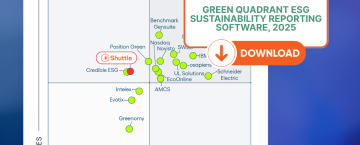At ChangeNOW 2025, sustainability leaders gathered to rethink corporate reporting and share best practices. Among the standout sessions was our workshop: “CSRD Reporting – Lessons from 2024 to Excel in 2025 and Beyond”, co-hosted by kShuttle and RSM France.
The event drew a full house at the Green Bubble stage, proving just how urgent and relevant CSRD has become for companies across Europe – and increasingly, globally.
The Speakers
🎤 Laure Razat, Head of Sustainability Solutions at kShuttle
🎤 Charlotte Jonchère, CSR Manager, RSM France
🎤 Vincent Sommer D’Yvoire, Head of Alliances, kShuttle (moderator)
From Regulation to Transformation: Key Workshop Highlights
🔍 Why CSRD, Why Now?
Laure and Charlotte opened with personal insights into their journey toward sustainability – stories that reflect a wider movement of professionals shifting their focus to impact-driven work.
For many, CSRD is no longer just about compliance. It’s an opportunity to realign corporate strategy with long-term environmental and social goals.
📊 The ExRP Approach: Simplifying Complexity
kShuttle presented its Extended Regulatory Performance (ExRP) platform, designed to unify fragmented ESG reporting into a coherent, actionable system. With CSRD, companies face hundreds of mandatory data points – up to 1,100. The ExRP platform integrates four key layers:
- Technology: a modular software that adapts to diverse reporting frameworks (CSRD, GHG, Taxonomy, CDP, etc.)
- Regulation embedded: always up-to-date with legal standards
- Organisational alignment: maps the company’s actual structure and ESG maturity
- Analysis-ready: supports forecasting, benchmarking, and impact-driven decision-making
🏢 From Clients’ Pain Points to Best Practices
kShuttle and RSM shared field insights: how clients like M6, SNCF or CMA CGM tackled the operational challenges of CSRD. Key learnings include:
- The importance of data governance and ownership across departments
- The need to involve finance and sustainability teams equally
- The challenge of tracking emissions across complex value chains (e.g. freight vs. last-mile delivery)
- Why Excel is not enough for audit-proof reporting
🧠 Omnibus and What’s Next
Charlotte unpacked the implications of the Omnibus proposal: delaying reporting deadlines for wave 2 and 3 companies, simplifying data requirements, and redefining thresholds. But she reminded the audience: voluntary reporting remains strategic, especially with growing pressure from value chains and financial institutions.
Conclusion
The future of corporate sustainability reporting is a realm of immense opportunity.
The webinar on 25 March 2025 provided a masterclass in turning regulatory challenges into strategic advantages.
By understanding the evolving regulatory landscape, defining a clear materiality universe, leveraging cutting-edge data management tools, and ensuring rigorous assurance, companies can not only meet new requirements—they can lead the way in sustainable innovation.
Now is the time to reimagine sustainability reporting. Elevate your processes, build trust, and drive lasting change in an ever-evolving business landscape.
📢 Any questions? Need clarification? Talk to us on LinkedIn, or contact us. We’re here to help!


